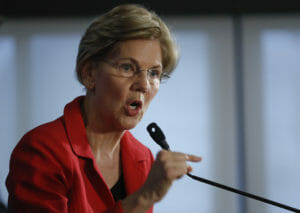Change Big Donors Can Believe In
The candidates' coffers are swelling with larger and larger bundles of cash, but don't hold your breath waiting for the extended television discussions of this, because it's the broadcasters who profit the most.Change is at hand. Barring a repeat of the protracted Florida recount of 2000, there will be a victor soon in the U.S. presidential election.
With the economic crisis, change is something in your pocket that you want to hold on to.
The campaigns are not dealing in small change, though. Their coffers, particularly the Democrats’, are swelling with larger and larger bundles of cash, ensuring that politicians will remain beholden to special interests and wealthy donors. Don’t hold your breath waiting for the extended television discussions of this, because it’s the broadcasters who profit the most.
Barack Obama broke records with recently announced September fundraising levels that exceeded all predictions, bringing in $150 million. Since Obama opted out of the public financing system, he can spend freely from his war chest right up to the election. John McCain accepted public financing and has limits imposed on his campaign, with $84.1 million in public money to spend in the general election. McCain is now outspent on advertising by the Obama camp by 4-to-1.
The Obama campaign has “flooded the zone” with advertising. It has a full-time “Obama Channel” on Dish Network. Ads have been inserted into video games like “Guitar Hero.” The campaign has bought a full 30 minutes of prime-time airtime on NBC, CBS and Fox, six days before the election. Fox moved the start time of the World Series to accommodate the ad buy.
Obama’s campaign is credited with receiving an unprecedented number of small donations from among its historic 3.1 million donors. Campaign manager David Plouffe says the campaign’s average donation is under $100. A Washington Post analysis of Federal Election Commission data shows, though, that only a quarter of this vast number of donors fall into the “small” category (under $200), which is a smaller percentage than that achieved by George Bush in his 2004 run.
According to the Center for Responsive Politics, a nonprofit group that tracks campaign contributions, the funds raised in presidential campaigns has skyrocketed. The 1976 campaign, the first campaign that included public financing, saw a total of $171 million raised (about $570 million, adjusted for inflation). The current campaign weighs in at close to $1.6 billion, and the group expects the total to reach $2.4 billion. While donations to candidates are supposed to be limited to $2,300 for the general election (an additional $2,300 is allowed for the primary season, per candidate), huge loopholes exist. Most notable are the “joint fundraising committees,” in which the presidential candidate partners with his party to form a fundraising organization. McCain and the Republican National Committee’s is called McCain Victory 2008 and can receive donations as high as $70,000, which then get distributed to the presidential campaign, the national party and to key state parties. Obama and the Democratic National Committee created the Obama Victory Fund, to which donors could give $28,500. As The Washington Post just reported, the Democrats found that sum too limiting, so they created the Committee for Change, which allows donors to give up to $65,500. That’s a helluva lot of change.
Bill Buzenberg, executive director of the Center for Public Integrity, told me, “What is wrong with this is, after this election, the people have bundled and put together big pots of money are going to come back to whoever is elected, and they will be looking for access and influence.”
The $2-billion presidential race also guarantees vast profits for the broadcasters, the national networks and the local television stations. Hundreds of television stations are using the public airwaves, imposing themselves between the candidates and the public.
Access to the public airwaves for political candidates should be free. Says Buzenberg: “Every local television station I have been to, I say, ‘How do you do in election years?’ They say, ‘We buy new cameras, new sets.’ It is a huge benefit to them. The commercial broadcasters are cleaning up this year like never before, and you’ll never hear them questioning the system that allows so much money to come back to them.”
Is public financing of campaigns dead? A year ago, Sen. Obama said, “I have been a longtime advocate for public financing of campaigns combined with free television and radio time as a way to reduce the influence of moneyed special interests.” Regardless of who the winner is, the next president will enter the White House with a long list of major donors to thank.
Denis Moynihan contributed research to this column.
Amy Goodman is the host of “Democracy Now!” a daily international TV/radio news hour airing on more than 700 stations in North America. She has been awarded the 2008 Right Livelihood Award, dubbed the “Alternative Nobel” prize, and will receive the award in the Swedish Parliament in December.
© 2008 Amy Goodman
Distributed by King Features Syndicate
Your support matters…Independent journalism is under threat and overshadowed by heavily funded mainstream media.
You can help level the playing field. Become a member.
Your tax-deductible contribution keeps us digging beneath the headlines to give you thought-provoking, investigative reporting and analysis that unearths what's really happening- without compromise.
Give today to support our courageous, independent journalists.







You need to be a supporter to comment.
There are currently no responses to this article.
Be the first to respond.